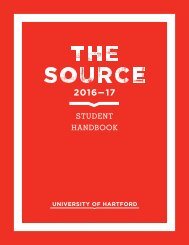advising
You also want an ePaper? Increase the reach of your titles
YUMPU automatically turns print PDFs into web optimized ePapers that Google loves.
ADVISING HANDBOOK FOR FIRST-YEAR STUDENTS<br />
CH 114 Principles of Chemistry I [4]<br />
Chemistry of solids, liquids, gases, and solutions; colligative<br />
properties, bonding theory, acids and bases, and chemical equilibria.<br />
Designed for students, such as nursing, health science, humanities,<br />
and social science majors, who desire or require a one-semester<br />
introduction to the principles of inorganic and physical chemistry.<br />
May be used to fulfill part of the general education distribution<br />
requirements in the natural sciences. The combination of CH 114<br />
and CH 136 constitutes a one-year general survey of the major<br />
areas of chemistry. Not intended for majors in biology (B.S.),<br />
chemistry, engineering, or physics, or students planning to apply to a<br />
professional school in medical sciences (premedical, predental, etc.).<br />
No credit given to students who have received credit for CH 110<br />
and/or CH 111 or equivalent. One three-hour laboratory in addition<br />
to the lecture. Prerequisite: Working knowledge of algebra and<br />
logarithms. Laboratory fee.<br />
CH 136 Principles of Chemistry II [4]<br />
The chemistry of carbon compounds, including functional group<br />
chemistry, natural products, stereochemistry, and compounds and<br />
processes of biochemical importance. Designed for students who<br />
desire or require a one-semester introduction to organic chemistry<br />
and biochemistry. The combination of CH 114 and CH 136<br />
constitutes a one-year general survey of the major areas of chemistry.<br />
(Not intended for majors in biology [B.S.], chemistry, engineering,<br />
or physics, or for students planning to apply to a professional school<br />
in the medical sciences [premedical, predental, etc.]). No credit<br />
given to students who have received credit for CH 230 and/or CH<br />
231 or equivalent. One three-hour laboratory in addition to lecture.<br />
Prerequisite: CH 111 or 114. Laboratory fee.<br />
Cinema<br />
CIN 150/CMM 150 Introduction to Film [3]<br />
Study of cinema as a cultural and artistic form. Emphasis on<br />
techniques (camera, editing, color, sound, composition) and styles<br />
(realism, expressionism, abstraction). Film fee.<br />
CIN 225W Storytelling for the Screen [3]<br />
A writing workshop focusing on conceptualization, planning,<br />
and scripting of various film and video projects. Students write<br />
screenplays for a short film and segments of a full-length feature or<br />
documentary project. Focus is on the skill of drafting and the specific<br />
uses of language for the screen, and on refinement and presentation<br />
of ideas into treatment or proposal form.<br />
CIN 230 Introduction to Filmmaking [3]<br />
Introduction to basic principles, techniques, and aesthetics of<br />
motion-picture production. The course emphasizes practice with<br />
a series of several short-term assignments in the first two-thirds of<br />
the semester, and the development of a focused production project<br />
in the last third of the semester. Working in small production crews<br />
and with the medium of digital video, students gain a practical and<br />
theoretical understanding of the basic principles of camera and<br />
editing for motion-picture production. Prerequisite: CIN/CMM 150.<br />
Laboratory fee.<br />
CIN 250 World Cinema [3]<br />
An introductory survey of international cinema, selecting classic<br />
films of the major national cinemas (France, Italy, Germany, Sweden,<br />
Russia, Japan) along with important works from other cinemas (e.g.,<br />
Yugoslavia, India, Brazil, Senegal). Weekly screenings. Prerequisites:<br />
CIN 150 or CMM 150. Film fee.<br />
CIN 251W Film History [3]<br />
From 1895 to the present, a survey of the defining developments<br />
in technology (sound, color, widescreen) and national styles<br />
(primitive cinema, silent cinema, German expressionism, Soviet<br />
montage, French poetic realism, classical Hollywood cinema, Italian<br />
neorealism, French New Wave, American experimental cinema, the<br />
new Hollywood). Weekly screenings. Prerequisites: CIN 150 or<br />
CMM 150. Film fee. (Writing-intensive course)<br />
CIN 252W Film Analysis [3]<br />
Close study of the formalism of Eisenstein, the realism of Bazin,<br />
the auteur theory, and semiotics. Film analysis asks whether a movie<br />
is more like a painting, a window on the world, or a mirror for the<br />
desires of the audience; it asks whether there is a language of film,<br />
whether seeing a film is like dreaming, and what makes for the<br />
impression of reality in the cinema. Weekly screenings. Prerequisite:<br />
CIN/CMM 150. (Writing-intensive course) Film fee.<br />
Communication<br />
CMM 110 Communication in the Digital Age [3]<br />
The primary goal of the course is to provide students with<br />
an overview of the foundations and breadth of the field of<br />
communication. A particular focus is placed on the role that<br />
technology plays in the major areas of the field —human<br />
communication studies, media and journalism, and advertising<br />
and public relations. The course also addresses ethical dilemmas<br />
in communication such as deception, manipulation, and others.<br />
Students are required to engage in critical thinking, analysis,<br />
presentation, and application utilizing concepts addressed in<br />
the course.<br />
CMM 150/CIN 150 Introduction to Film [3]<br />
Study of cinema as an art form. Emphasis on techniques (editing,<br />
color, sound, composition) and styles (realism, expressionism,<br />
impressionism, abstraction). Film fee.<br />
CMM 212 Persuasion [3]<br />
Course is designed to heighten student’s understanding of the ways<br />
in which people influence one another with speech and symbolic<br />
gestures. Couse provides an analysis of social aspects of persuasion,<br />
cultural basis on belief, and theories of attitude change. Reasoning<br />
and rhetoric in a variety of contexts, including advertising, political<br />
campaigns, and social movements, are examined. Prerequisite(s);<br />
CMM 110.<br />
CMM 222 Small-Group Communication [3]<br />
Introductory examination of the processes affecting small-group<br />
communication. Students study leadership, member roles, and group<br />
development. In addition, factors affecting the maintenance function<br />
of groups and the outcomes of group experiences are emphasized.<br />
Prerequisite: CMM 110.<br />
18



